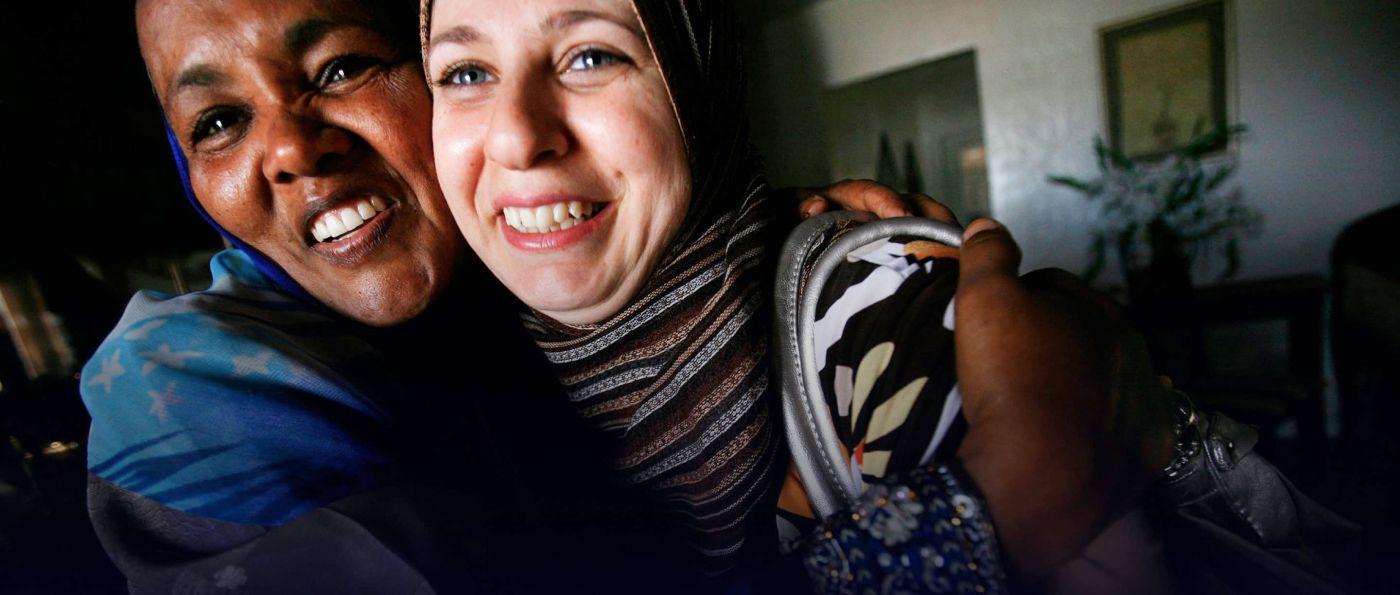Humanitarian parole 101

Overview:
Individuals face humanitarian crises all over the world. From war to political instability, the drivers of forced migration lead families to make the impossible choice to leave their homes in search of safety and security. Through humanitarian parole, these individuals can find temporary relief from the dangers they face on the home front.
This section explains humanitarian parole, its purpose, and its operation. We also examine the legal framework behind parole, the eligibility criteria, and its implications for people navigating crises with few options and little time.
What is humanitarian parole?
Humanitarian parole is a temporary status for individuals facing urgent crises to enter the U.S. legally.¹ Under the Immigration and Nationality Act, the Secretary of Homeland Security, appointed by the sitting president, can use their discretion to temporarily parole any noncitizen applying for admission into the U.S. for urgent humanitarian reasons or significant public benefit.² Humanitarian parole has also been used to temporarily resettle significant numbers of people into the U.S. following armed conflicts or other crises.
For the purposes of this webpage, we will be covering humanitarian parole sponsorship specifically. While there are many subsets to humanitarian parole processes, Welcome.US works primarily within humanitarian parole sponsorship, which is differentiated from other processes through the mandatory element of a financial sponsor. Therefore, we will focus on this subset.
How does humanitarian parole work?
If a person is in need of humanitarian parole or qualifies for a categorical parole program,* they can apply through the U.S. Citizenship and Immigration Services (USCIS). Applications must:
- Pass a rigorous vetting process, background check, and financial review
- Secure a U.S.-based financial sponsor (preferably a lawful permanent resident or U.S. citizen)
- Receive approval and travel authorization from USCIS
Parole is a form of lawful entry to the United States. It is a temporary status that Congress authorized the president to grant for “urgent humanitarian reasons” or “significant public benefit”—leaving both terms’ meanings up to executive discretion. Parole is issued on a case-by-case basis, and often follows a two- or three-year period.
Humanitarian parole recipients do not have a pathway to citizenship under this status, and the status can be terminated. It is a discretionary status that can be granted or ended at any time by executive order of the president. They generally receive work authorization and public benefits.
If an individual’s parole status expires or is terminated, and they have not applied for or received an alternative immigration status, they will begin to accrue unlawful presence.
What is the history of humanitarian parole?
History of humanitarian parole
Humanitarian parole is not a new program; it is a legal authority that has been used for nearly a century by Republican and Democratic presidents alike to respond to humanitarian crises. Not all of these examples included sponsorship, but all fall under parole. Here are some key moments of parole being used throughout America’s history:
- 1956: Parole granted to Hungarians after an uprising in their country.
- 1959–1965: Parole granted to Cubans after Fidel Castro took power, leading to the Cuban Adjustment Act in 1966.
- 1962: Parole granted to 15,000 Chinese immigrants after the Communist rise.
- 1975: Parole granted to Vietnamese citizens during the Vietnam War.
- 1988: Parole was opened for immigrants from the Soviet Union after they were denied refugee status.
- 2006: Parole granted to Cuban doctors and other medical professionals, which led to the Cuban Family Reunification Parole program in 2007.
- 2014: The Haitian Family Reunification Parole Program was established.
- 2021: Parole granted to Afghans, Cubans, Haitians, Nicaraguans, Venezuelans, and Ukrainians through their respective categorical parole programs.
Modern humanitarian parole recipients
Why did Ukrainians receive humanitarian parole?
In February 2022, Russia invaded Ukraine. This led over 6 million Ukrainians to flee, as civilians faced ongoing violence, damaged cities, and limited access to essential services like water and sanitation. In response, the Uniting for Ukraine (U4U) sponsorship program was created to allow Americans to privately sponsor Ukrainians to find safety in the United States. This program enabled more than 200,000 Americans to sponsor Ukrainians and help them find safety in communties across the country.
Why did Cubans, Haitians, Nicaraguans, and Venezuelans receive humanitarian parole?
- Cuba: The country is facing its most severe economic crisis in over 20 years, with extreme food shortages and daily hardships.
- Haiti: Political instability, widespread poverty, and catastrophic natural disasters have left millions struggling to survive.
- Nicaragua: The government has implemented many authoritarian political measures, creating an unstable and repressive environment.
- Venezuela: Economic collapse and authoritarian rule have forced over 7 million people to flee in search of food, stability, and security.

Story spotlight
Read about a Ukrainian family who came to the U.S. through the Uniting for Ukraine sponsorship program.

Story spotlight
Read about a Nicaraguan family who was sponsored by family friends through the CHNV sponsorship program:
FAQs about humanitarian parole
Why is it called humanitarian parole?
The "humanitarian" aspect of humanitarian parole emphasizes its emergency and need-based nature. To qualify, individuals must demonstrate an imminent threat to their safety or well-being. The term "parole" reflects the temporary scope of this status—recipients are not granted a pathway to permanent residency. Instead, they receive limited, short-term protection solely in response to urgent humanitarian circumstances.
Are humanitarian parole beneficiaries vetted before entering the United States?
Yes, humanitarian parole beneficiaries are thoroughly vetted before entering the U.S. This includes background and security checks, biometric screening (such as fingerprints and photos), and a review of supporting documents. U.S.-based sponsors must first be approved, after which beneficiaries undergo additional vetting by U.S. Customs and Border Protection. Final inspection occurs at the port of entry before parole is granted.
What rights do humanitarian parole beneficiaries receive upon entry to the United States?
- Permission to live in the U.S. temporarily: Parole allows individuals to stay in the U.S. for the duration granted by the Department of Homeland Security.
- Work authorization: Parolees may apply for an Employment Authorization Document (EAD) by submitting Form I-765. Once approved, they can legally work in the U.S.
- School enrollment: Children can attend school, and adults may access some educational opportunities, depending on local and state policies.
Can I sponsor an individual or family through a humanitarian parole program?
As of Jan. 20, 2025, Department of Homeland Security (DHS) ended the Processes for Cubans, Haitians, Nicaraguans, and Venezuelans (CHNV) program. The program is not accepting new applications, pending applications will not be processed, and no new travel authorizations will be issued.
Additionally, as of Jan. 28, 2025, DHS has paused the Uniting for Ukraine (U4U) program. The program is not accepting new applications, pending applications will not be processed, and no new travel authorizations are being issued.

